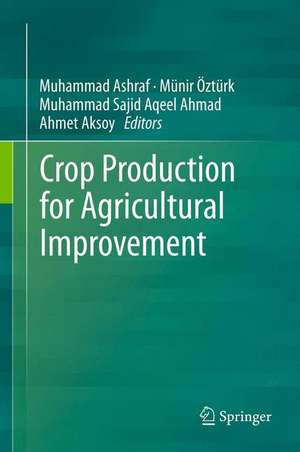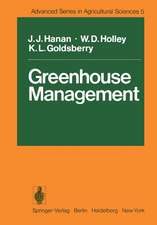Crop Production for Agricultural Improvement
Editat de Muhammad Ashraf, Münir Öztürk, Muhammad Sajid Aqeel Ahmad, Ahmet Aksoyen Limba Engleză Hardback – 26 mai 2012
| Toate formatele și edițiile | Preț | Express |
|---|---|---|
| Paperback (1) | 1077.06 lei 38-44 zile | |
| SPRINGER NETHERLANDS – 23 aug 2016 | 1077.06 lei 38-44 zile | |
| Hardback (1) | 1247.26 lei 43-57 zile | |
| SPRINGER NETHERLANDS – 26 mai 2012 | 1247.26 lei 43-57 zile |
Preț: 1247.26 lei
Preț vechi: 1521.05 lei
-18% Nou
Puncte Express: 1871
Preț estimativ în valută:
238.67€ • 249.81$ • 198.64£
238.67€ • 249.81$ • 198.64£
Carte tipărită la comandă
Livrare economică 31 martie-14 aprilie
Preluare comenzi: 021 569.72.76
Specificații
ISBN-13: 9789400741157
ISBN-10: 9400741154
Pagini: 850
Ilustrații: VII, 796 p.
Dimensiuni: 155 x 235 x 41 mm
Greutate: 1.29 kg
Ediția:2012
Editura: SPRINGER NETHERLANDS
Colecția Springer
Locul publicării:Dordrecht, Netherlands
ISBN-10: 9400741154
Pagini: 850
Ilustrații: VII, 796 p.
Dimensiuni: 155 x 235 x 41 mm
Greutate: 1.29 kg
Ediția:2012
Editura: SPRINGER NETHERLANDS
Colecția Springer
Locul publicării:Dordrecht, Netherlands
Public țintă
GraduateCuprins
Crop improvement through different means: Challenges and prospect.- PART I. BREEDING FOR CROP IMPROVEMENT.- Bridging genomic and classical breeding approaches for improving crop productivity.- Breeding for improved drought tolerance.- Breeding for biotic stress resistance/tolerance in plants.- The American halophyte Prosopis strombulifera, a new potential source to confer salt tolerance to crops.- Breeding for Biotic Stress Tolerance in Plants.- Breeding Wheat for Salt Tolerance and Stem Rust Resistance.- The potential of breeding okra (Abelmoschus esculentus L.) for water stress tolerance.- PART II. BIOTECHNOLOGY , MOLECULAR BIOLOGY AND GENETICS.- Biotechnology as an aid for crop improvement to overcome food shortage.- Plant Genetic Engineering: Problems and Applications.- Agrobacterium tumefaciens and its Use in Plant Biotechnology.- Progress and prospects for efficient micropropagation of woody plants.- Novel Methods in Micropropagation of Pistachio.- Crop productivity and water useefficiency: The role of carbon isotope discrimination technique.- Behaviour of Plant Pathogens for Crops under Stress during the Determination of Physiological, Biochemical, and Molecular Approaches for Salt Stress Tolerance.- Biochemical and molecular aspects of drought tolerance in wheat Triticum L. Genotypes.- Molecular basis of disease resistance in cereal crops: An overview.- Polyamines: Role in plants under abiotic stress.- PART III. CROP MANAGEMENT.- Practices in Saskatchewan, Canada.- Invasive weed species: A threat to sustainable agriculture.- An overview of plant growth promoting rhizobacteria (PGPR) for sustainable agriculture.- Arbuscular mycorrhizae for sustainable agriculture.- A site-specific potassium fertilization approach to overcome sporadic response of crops.- Optimal Supply of Micronutrients Improves Drought Tolerance in Legumes.- Potential of Rhizobia for Sustainable Production of Non-legumes.- Effect of Drip and Subsurface Drip Irrigation with Saline Water on Tomato Crop.- Lipid and carbohydrate metabolism of cowpea (Vigna unguiculata L. walp) cultivars in relation to temperature stress.- Transcriptomics and proteomics analysis of root nodules of model legume plants.- A Review on Barley Yellow Dwarf Virus.
Notă biografică
Textul de pe ultima copertă
In the recent years, the looming food scarcity problem has highlighted plant sciences as an emerging discipline committed to devise new strategies for enhanced crop productivity. The major factors causing food scarcity are biotic and abiotic stresses such as plant pathogens, salinity, drought, flooding, nutrient deficiency or toxicity which substantially limit crop productivity world-wide. In this scenario, strategies should be adopted to achieve maximum productivity and economic crop returns. In this book we have mainly focused on physiological, biochemical, molecular and genetic bases of crop development and related approaches that can be used for crop improvement under environmental adversaries. In addition, the adverse effects of different biotic (diseases, pathogens etc.) and abiotic (salinity, drought, high temperatures, metals etc) stresses on crop development and the potential strategies to enhance crop productivity under stressful environments are also discussed.
Caracteristici
Molecular biology approaches to identify key genes responsible for traits involved in crop improvement Potential biochemical and physiological indicators for successful breeding for crop improvement Selection strategies (through breeding, biotechnological approaches and marker assisted selection etc.) for selection of high yielding crops Nature of environmental adversaries that affect plant productivity from the viewpoint of three interrelated disciplines; eco-physiology, breeding, and socio-economics



